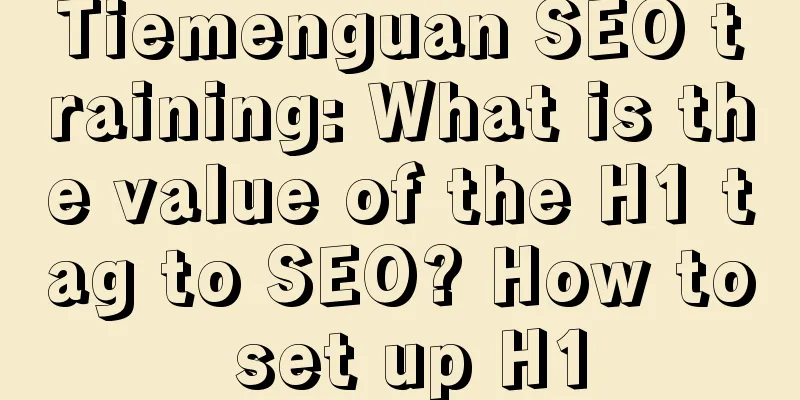Tiemenguan SEO training: What is the value of the H1 tag to SEO? How to set up H1

|
As we all know, the H1 tag is one of the most important elements on a single page of a website. A heading is a section of HTML code that allows you to highlight certain words on a page. To understand how headlines work on a website, let’s think of magazines and newspapers. The title of a newspaper article is usually larger and more visible than the other words. It can be colored, bold, underlined, and the purpose is to make the title more attention-grabbing. You can browse the page to find the part you want to watch. An H1 tag is similar to this, usually the largest text on the page and serves as the main heading for the content on that page. Tiemenguan SEO training: What is the value of the H1 tag to SEO? How to set up H1 As algorithm updates continue to emerge, page element tags will affect rankings. Some SEO methods are starting to fade away. As far as H1 is concerned, H1 tags have not lost their magic as H1 drastically improves the SEO of a website. The Importance of H Tags Why are H tags so important? Tags play an important role in building content for SEO and user experience (UX). When designing a page, we will include H1~H6 tags, which will make the structure of the page clearer and make it easier for users to browse the page. Search engines mainly obtain keywords from content, tags and titles, so we need to make better use of H tag settings. Implementing the H1 Tag on Your Website For future reference, we’ve got a basic guide on how to add an H1 to your website, as well as things to keep in mind when proactively adding titles to your pages: 1. Add H1 to every page All pages on your site should include an H1, and the title should only appear once at the top of the page. H1 is called an HTML tag and is used to display the main title of a web page. 2. Make Each H1 Unique Every page should have a unique H1. All web pages should have unique page titles. Since each web page should contain unique content, make sure your H1 directly explains what that page is about. 3. Insert keywords in the title Search engines pay close attention to the keywords in the H1 tag. When crawling, search engines want keywords to cover the main subject of the web page and avoid using keywords that are irrelevant to the content of the page. 4. Crawl and index titles Search engine spiders come to rebuild or index your site. Spiders pay particular close attention to the content contained in the H1 tag. Crawls can be based on several other metrics, including the number of pages, the size of the content, and crawl limits, such as the number of parameters in the URL. H1 tag has a great impact on SEO We hope this guide has given you a better understanding of how H1 works, and how to use it. Titles are very important to your website content, traffic, and search ranking. By optimizing H1, you will give your customers a better experience and achieve a good ranking in searches. |
<<: Analysis of mainstream [information flow advertising] channels, the war is about to break out!
>>: Where is the way out for self-media in 2017?
Recommend
Talk about 5 distribution mechanisms of video content
What position does content distribution occupy in...
The "American consensus" on blockchain has been formed: embrace technology instead of blocking it
The United States is already taking drastic actio...
The scam that has led millions of people to believe that eating dark chocolate can help them lose weight is actually like this!
I believe many people have heard that eating dark...
Is bamboo a tree or a grass? No! It is actually a "close relative" of rice
Review expert: Xia Xiaofei, Secretary General of ...
From NetEase Cloud Music to DJI, how was the “subway package” masterpiece created?
Shenzhen Metro Line 1 has been soaring these two ...
Double 11 Marketing Activity Analysis Manual
Double Eleven is approaching, and it is the day w...
Why does the peony become the "national flower" by surpassing the peony?
Although there is no final conclusion, if asked w...
What is the relationship between rocks and human life? Let’s start with food, clothing, housing and transportation
If you were asked what is the most widely used ma...
BAK Battery will mass-produce super batteries next year, with the largest share of domestic cylindrical battery market
On September 16, BAK Battery and Cadenza Innovati...
WeChat Card and Coupon Interface
This update of WeChat public platform adds WeChat...
400 million daily active users, covering more than 200 sub-industries, more than 40,000 active service providers, and the "Mini Program Economic Circle" has begun to take shape
On September 9, the WeChat special event "We...
Guide for the National Day holiday, Youji uses VR to give you a different kind of fun
2016 can be called the first year of VR. With onl...
Sleeping in on the weekends may reduce your risk of heart disease by 20%! Just get enough sleep →
Compiled by: Gong Zixin Can you really make up fo...
10 minutes to understand the optimization techniques of information flow advertising copy
In early February, Facebook released its full-yea...
Why is it always China Telecom that leaks information?
Around the 22nd of last month, an internal speech...


![How to operate Tmall [Billion Club] merchant page?](/upload/images/67cc3a401a856.webp)






